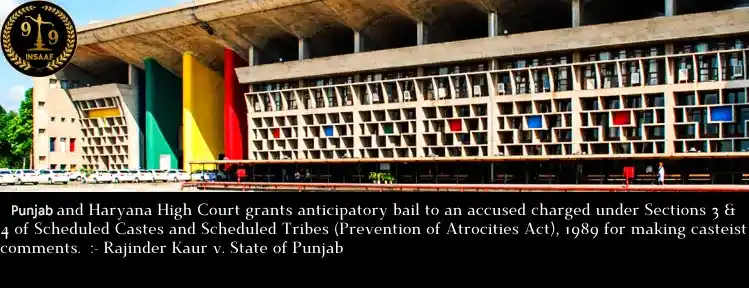2023-Nov-29

The Punjab and Haryana High Court granted bail to the Appellant against the order passed by the Special Judge, Ludhiana with application under Section 438 Cr.P.C. seeking anticipatory bail in case registered under Sections 302, 323 of the IPC, 1860 {Section 307 of the IPC, 1860 and Sections 3 & 4 of Scheduled Castes and Scheduled Tribes (Prevention of Atrocities Act), 1989 had been declined.
The facts of the case are that appellant’s husband was the owner of a banquet hall which he had sold to one Sewak Singh, however he had not disclosed this fact to his wife. The appellant on coming to know of the sale of the banquet hall had come at the crime scene, at the banquet hall, and hurled abuses on Sewak Singh and his other accomplices stating that what was their ‘ aukat’ (status) to purchase the palace and uttered casteist words to Sewak Singh, who at that time went inside the banquet hall without saying anything. Later on, Sewak Singh along with others were talking to each other about the said incident, when the husband of the appellant brought a Swift Car and stuck the same against Sewak Singh again and again, causing injuries to Sewak Singh, and eventually his death. An FIR was registered against the husband of the appellant and the appellant was also nominated as an accused under Section 3 & 4 of SC/ST Act. The appellant filed an application under Section 438 Cr. P C sought anticipatory bail but the same was dismissed by the Special Judge on account of bar contained in Section 18 of the SC/ST Act.
Before the High Court, the Counsel for the appellant contended that all the allegations against the appellant were false and that no role could be attributed to her. It was also suggested that entire allegations were against the husband of the appellant, who has already been arrested. It was submitted that FIR did not disclose as to what words were used by the appellant, which itself showed the allegations to be vague, having no basis. Besides, there was nothing to show that appellant had any prior knowledge of the caste of the complainant, compelling her to utter any such words and so, prima facie, ingredients of Section 3 & 4 of The SC & ST, Act 1989 were not fulfilled. Besides, the alleged casteist derogatory words had not been used within public view.
The counsel further pointed out that as per the allegations contained in the FIR itself, appellant was taken away by her husband after the argument and that it was only later on in the evening that alleged incident of collusion of car took place and that the dispute was regarding ownership and sale of the Banquet Hall between the co-accused and the complainant party, in which appellant had no involvement.
The High Court observed that:
No doubt that Section 18 & 18A of the SC & ST, Act provides that provisions of Section 438 of the Code of Criminal Procedure shall not apply in relation to any case involving the arrest of any person on an accusation of having committed an offence under the SC & ST, Act but the Court is not debarred from considering as to whether, from the accusations made, prima facie offence under Section SC/ST, Act is made out or not.In the present case, the only attribution against the appellant is that she uttered the words as to what was the status of complainant to purchase the Banquet Hall and used casteist words against him. The said occurrence took place in the Banquet Hall, when only the complainant party; appellant and her family members were present i.e., not within another public view. The question arises as to whether in such circumstances, any of the provisions of Section 3 or 4 of SC/ST Act are attracted.
In the present case, the perusal of the FIR reveals that there is no allegation that accused Rajinder Kaur i.e., appellant knew that Sewak Singh complainant-deceased belonged to Scheduled Caste. Besides, no particular caste has been uttered by the appellant so as to insult or humiliate the complainant. Allegations are to have been used casteist words, without specifying as to what words were used. This authority rather supports the case of the appellant, because there is no allegation that appellant knew the victim to be belonging to Scheduled Caste. No particular caste has been disclosed. Even otherwise, the alleged casteist words were uttered in Banquet Hall i.e. not in any place within the public view.
What can the Legal Experts do for you? Our team of lawyers is ready to help you in minutes with any legal question.
 Whatsapp
Whatsapp
 Toll Free :-
1800-212-9001
Toll Free :-
1800-212-9001